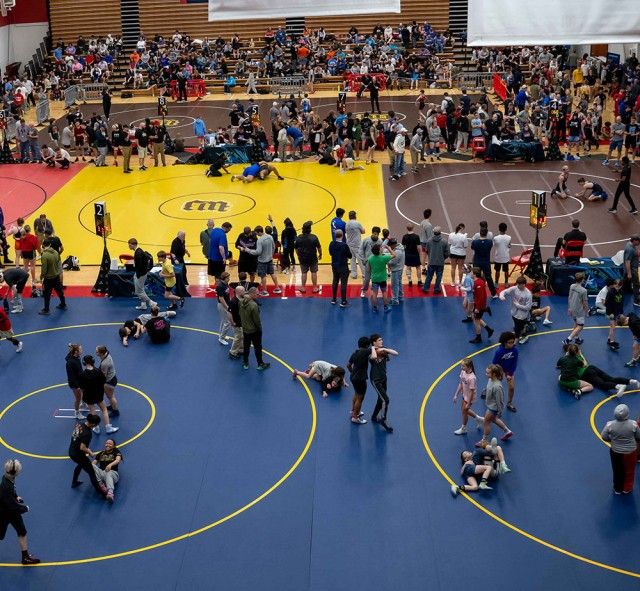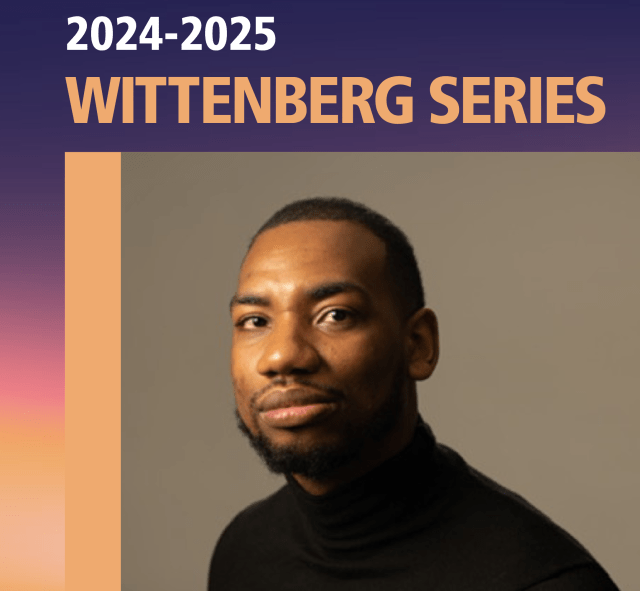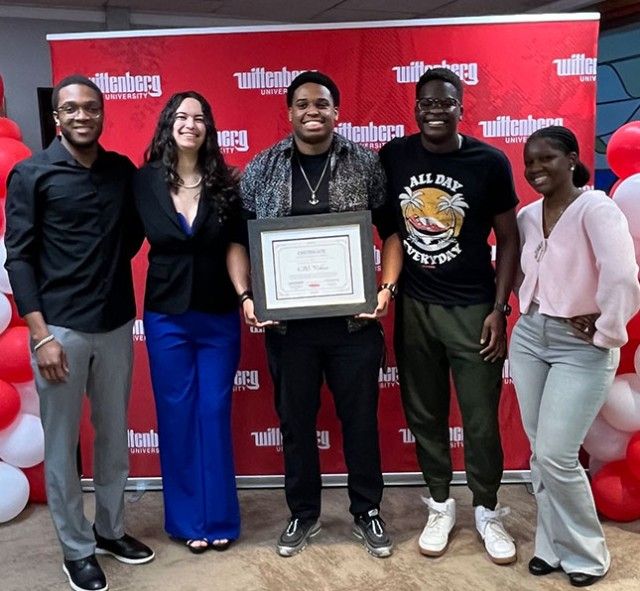Wittenberg University is committed to excellence in teaching and scholarship. The following is a collection of professors’ contributions to the Academy, Campus, and the Community.
In the News
Richard Phillips, associate professor of biology will join Billy Davis, associate professor of psychology, as a faculty co-lead for the First Year Research Award (FYRA) program. The duo will work together to aid the Office of Admission, their peers, and FYRA recipients to enhance the program and overall undergraduate research efforts.
Since the beginning of the FYRA program, Phillips has worked with 15 different FYRA students, noting that some of the benefits of the program include “making students better, more confident versions of themselves, while also providing clarity on potential career paths.” Phillips has a well-established and active undergraduate research program focusing on the ecology of mammals, birds, reptiles, and amphibians. During his time at Wittenberg, more than 50 undergraduate students have worked directly with him as part of his research program.
Professors Appointed to Direct Semester-Long Study Abroad Programs
Based on the recommendation of the International and Field Studies Committee, the following faculty members will serve as program directors to the semester-long study abroad programs:
Lutherstadt Wittenberg, Germany
- Spring 2025 - Elizabeth E. Powelson Professor of Biology Cathy Pederson
- Spring 2026 - Chair and Associate Professor of Sociology Nona Moskowitz
Costa Rica
- Spring 2025 - Professor of Psychology Stephanie Little
- Spring 2026 - Professor of Geology John Ritter
Cape Town South Africa
- Fall 2024 - Professor of English Lori Askeland
- Fall 2025 - Professor of Chemistry Ray Dudek
FIRE Week 2024
Thanks to all faculty members for submitting great ideas for FIRE Week 2024. FIRE Week will take place Spring of 2024, running Feb. 26 to March 1, and will provide opportunities for students to engage in-depth with faculty, staff, and other students on a wide range of topics. Each experience includes at least 35 hours of involvement with a reflective component at the end. Each opportunity also satisfies one of the experiential learning requirements for the Connections Curriculum (EXPR-100). Additionally, students can coordinate with the Hagen Center to have their experience satisfy the civic engagement requirement. There are 20 opportunities for students to explore, engage, and connect. Last year’s FIRE Week included 14 programs involving 150-plus students, 19 leaders, and 7,103 miles traveled.
FIRE Week experiences are open to all Wittenberg students. For more information about FIRE Week, please visit here.
Faculty Promotions
Earlier this year, the Board of Directors recognized many faculty members for their accomplishments and service.
- Newly tenured: Marie Bashaw, nursing
- Tenured and promoted to associate professor: Daniel Marous, chemistry; and Darin Keesing, theatre & dance
- Promoted to full professor: Sheryl Cunningham, communication & digital media
- Promoted to senior professor of practice: Erin Hill, education
- Recognized as emeriti professors: Doug Andrews, math & computer science; Ed Charney, art; Robin Inboden, English; and Lila Zaharkov, world languages & cultures
2023 Edith B. and Frank C. Matthies Award
Upon the recommendation of the Faculty Development Board (FDB), Michael Daiga, associate professor of mathematics education in the Department of Education, has been chosen to receive the 2023 Edith B. and Frank C. Matthies Award. The purpose of this award is ‘to further the education of selected and worthy teachers and to strengthen the faculty. FDB cited Daiga’s commitment to addressing the STEM teacher shortage through his plan to provide Wittenberg students the opportunity to work with the Great Smokey Mountain Institute at Tremont on outdoor experiential learning skills among the reasons for earning this distinction.
Collegium Award for Excellence and Innovation in Teaching
It was recently announced that Michael Anes, associate professor of psychology and chair of the department, was awarded the Collegium Award for Excellence and Innovation in Teaching. He joined the Wittenberg faculty in 2004 and has consistently demonstrated creativity, dedication, and compassion in his teaching. The Faculty Development Board (FDB) was particularly impressed with his commitment to an atmosphere of openness in the classroom. Student and peer evaluations reaffirmed his excellence in teaching.
Anes’ research interests include visual cognition, specifically in the processes by which humans recognize objects and faces. In addition to teaching and researching, he also co-directs "Wittenberg in Poland," a summer study abroad program, with Heather Wright, associate professor of political science. Moreover, Anes is co-directing the FY 2023 Fulbright-Hays Group Projects Abroad (GPA) grant, “Exploring the tension between democratic pluralism and nationalistic exclusion of the ‘other,” an award funded by the U.S. Department of Education.
A Fulbright U.S. Scholar, Anes previously conducted research in cognitive neuroscience in Poland during the 2010-11 academic year with the University of Finance and Management in Warsaw. He received his B.A. in communications from DePaul University in 1991, his M.A. in psychology from Michigan State University in 1996, and his Ph.D. in psychology from Boston University in 2000.
For more on his award, including faculty and student comments about his teaching, visit here.
Williams Receives Grant
The Office of Science in the U.S. Department of Energy recently awarded Jeremiah Williams, professor of physics, a grant in the amount of $47,089 for the investigation of a sudden compression in a dusty plasma with increasing magnetic field. The grant, operated through the Office of Fusion Energy Sciences, will run from now through April 30, 2025.
A ‘dusty’ or ‘complex’ plasma is an ionized gas consisting of ions, electrons, and small particulate matter (dust or ice) that is typically much smaller than the width of a human hair. In space, examples of dusty plasmas include the clouds from which stars and planets form, comet tails, planetary rings, and noctilucent clouds in the Earth's ionosphere. Dusty plasmas are also formed in the chemically active plasmas that are used in industrial plasma processing devices to create computer chips, contaminating the product and reducing overall yield, and the manufacturing of solar photovoltaic cells, where the dust can increase the overall efficiency of the resulting solar cells. Over the past few decades, the scientific relevance, and potential applications of charged microparticles in plasmas have grown significantly and show promise in a few applications that may have long term societal benefit.
Recent experiments have revealed an unexpected example of self-organization and critical behavior in a dusty plasma system in the presence of an increasing magnetic field when the dusty plasma underwent a sudden compression at a critical value of the magnetic field.
Williams’ study will make use of the unique capabilities in the Magnetized Plasma Research Laboratory at Auburn University, a collaborative research facility supported by the U.S. Department of Energy, to understand the physical mechanism responsible for this critical behavior. This will be done by a faculty member at a primarily undergraduate institutions and will support the training of an undergraduate student from a primarily undergraduate institution. The intention will be to have students working on the research as William’s last grant from the DOE that led to this work, involved three Wittenberg students.
Fulbright Scholar Liaison
Kati Fitzgerald, assistant professor of religion, will serve as Wittenberg’s Fulbright Scholar Liaison to the Fulbright Scholar Liaison Network. Fitzgerald brings deep experience with various Fulbright programs to this position. In 2017-18, she participated in the Fulbright IIE student program in China, and in 2019 she received a Fulbright-Hays doctoral dissertation award to study for six months in China.
At Wittenberg, Fitzgerald’s main goal will be to promote Fulbright Scholar programs and keep faculty and administrators abreast of opportunities through the Fulbright Network. John Ritter, professor of geology, will continue to serve as Wittenberg’s advisor for the Fulbright student program.
Published
Andrew Graff, associate professor of English and the director of creative writing, recently announced the publication of his second book ‘True North,’ through Ecco-HarperCollins Publishers. The author of best-selling novel ‘Raft of Stars,’ Graff has focused his second heartfelt novel around marriage, adventure, and whitewater rafting. Following one couple navigating the changing currents of family, community, and the river itself, ‘True North’ comes out Jan. 24, 2024. Preorders can be made here.
Kenneth E. Wray Chair in the Humanities Christian Raffensperger, professor and chair of history and director of the Ermarth Institute for the Public Humanities, has also been published recently.
‘The Ruling Families of Rus’ was published by Reaktion Books in August in collaboration with Donald Ostrowski , while ‘Rulers and Rulership in the Arc of Medieval Europe’ came out this month.
‘The Ruling Families of Rus’ is a new history of the region known as Kyivan Rus,’ a state in eastern and northern Europe from the late ninth to the mid-16th century that encompassed a variety of polities and peoples, including Lithuanian, Polish, Ottoman, and others. His book focuses on the history of the region via families and examines the development of Rus, Lithuania, Muscovy and Tver, and their relations and interconnections with the Mongols, Byzantines, and other groups.
‘Rulers and Rulership in the Arc of Medieval Europe,’ published by the Routledge, Taylor & Francis Group, challenges the dominant paradigm of what rulership is and who rulers are by providing examples from throughout medieval Europe in an effort to demonstrate to the reader that the way in which medieval Europe has been constructed in both the popular and scholarly imaginations is incorrect.
Raffensperger also put out an edited collection, ‘How Medieval Europe was Ruled,’ through the Routledge, Taylor & Francis Group. The book aims to demonstrate the multiplicity of types of rulers and polities that existed in medieval Europe with contributors discussing not just kings or queens, but countesses, dukes, and town leadership.
Guest Lecturer
Julius Bailey, professor of philosophy, chair of the department, and director of African & Diaspora Studies and of Justice, Law and Public Policy at Wittenberg University, will be a guest lecturer at Oberlin University on Tuesday, Nov. 7, from 5 to 6:30 p.m. in Bibbins Hall. The title of his lecture is “Hip Hop and Bad Faith Democracy, Where A Music and Resistance Conjoins.”
In Bailey’s last book 'Racism, Hypocrisy and Bad Faith,' he questions how deep America’s love is or is the love an idea and not a reality. Such duplicitousness is not new to hip hop. Just as cities across America are currently celebrating “Hip Hop at 50,” the irony lies in the fact that hip hop’s origins literally began as youth felt estranged from the very nation that now benefits from its existence. Bailey will discuss this, and other things, during his lecture.







